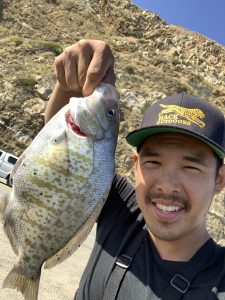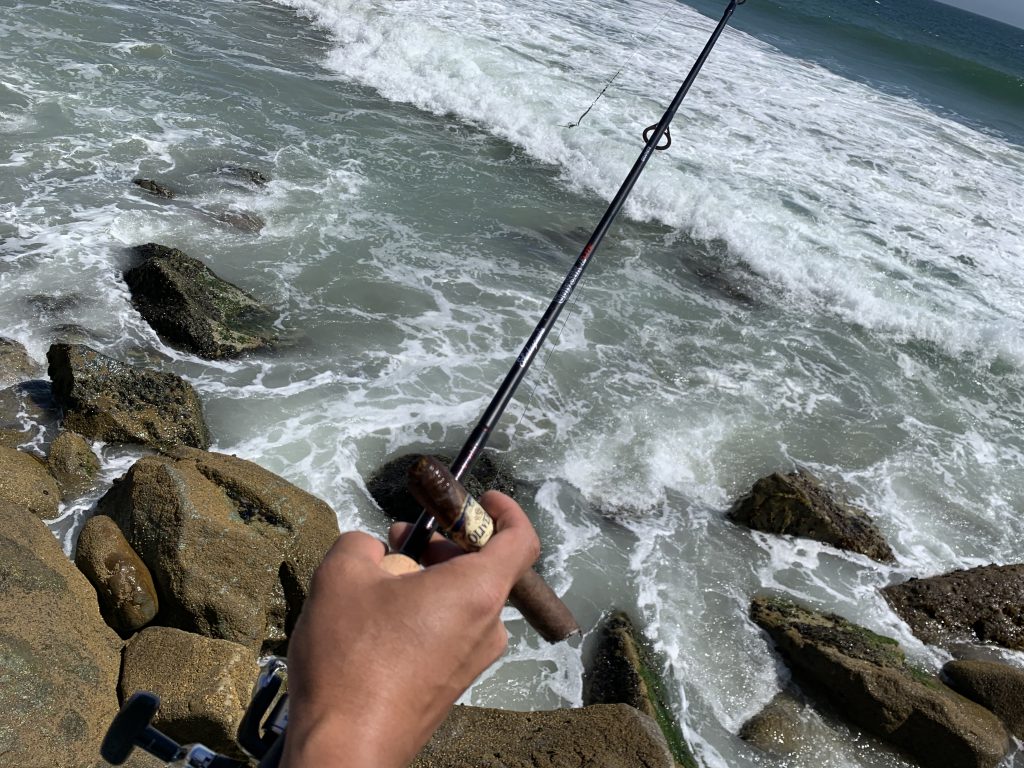Fishing is one of the great equalizers in this world. Whether you’re pier fishing for mackerel with squid or fishing for sharks from the surf, budget doesn’t get the fish to bite. Many anglers have experienced a moment where they’ve brought the hottest lures, only to be out fished by kids throwing hot dogs. Here are my budget saltwater fishing tips for anyone looking to increase their cost to fun ratio. The most important factor to catching fish is time with your line in the water.
Budget Saltwater Fishing Gear
Tip #1: Buy a combo. Combo rods and reels are a great way to save money by pairing the right-sized reel to the rod. Combos tend to be fractionally more expensive than a single rod or a single reel. If you want or plan to upgrade either piece later, you have the option to do so but the combo is a great starting point. I’d recommend spinning gear for saltwater fishing as
Tip #2: Buy versatile equipment. For example: A medium-fast 9ft steelhead rod works great for surf fishing and can also be used for most of your bass fishing. However, an 11ft surf medium-heavy rod is a more versatile option that can catch the same types of fish from the surf, all species from a pier, and can be taken on a deep sea charter with success.
Tip #3: Buy secondhand or reuse the gear you already have. Garage sales are a great place to find very cheap fishing gear. Saltwater is tougher on fishing gear. Getting sand and salt in a garage sale reel won’t make you cry.
Money Saving Fishing Hacks
Tip #1: Buy bait by the pound from your grocery store. Bait fishing is a cheap way to start fishing in saltwater. Some people are completely happy staying bait fishermen their whole lives – it simply catches fish.
Tip #2: Use soft plastic lures instead of hard plastic lures. The ocean has way more stuff to snag on than a local pond. While you may be able to pull in a few lily pads in freshwater, a giant ball of kelp is not the same. Because this article is about budget saltwater fishing tips, losing large amounts of money on tackle should be a no-brainer. It’s a sad day when you lose a $20 Lucky Craft, so stick to soft plastics that you’re more okay with losing.

Tip #3: Bring extra weights, hooks, and soft plastics. Saltwater fishing is a great way to lose tackle. Between giant kelp balls, coral, and fish with teeth; you’re bound to lose tackle.
Tip #4: Use braided line with leader. This is one of the most important saltwater fishing tips. I use a 1oz egg sinker for most of my saltwater fishing that I keep above the swivel tied to braided line. I tie leader below this so that when I do eventually break off, I’ll only lose my leader, hook, and bait. This is called the C-Rig, or the Carolina rig.
Fishermen are kind of the worst when it comes to leaving a mess. We should all have the goal to use biodegradable materials when fishing any waters. Braided line will decompose while mono and flouro will sit in a tangled ball for much longer. Selfishly, braided line also lasts a lot longer on the reel than mono and flouro and you can cast it further. I use 30lb for saltwater.
Saving Money on Bait
Tip #1: Again, buy by the pound. See what’s cheapest by the pound at the grocery store. I like to think about fishing economics. Should I be fishing bait that is $9 a pound for a fish that’s $3 a pound?
Tip #2: Save and store your leftover bait. Whether your bait is still good to fish again or not, it can be used. When I leave bait in the sun for too long and don’t think it’ll make good bait for catching fish, I’ll freeze it anyhow. This container of leftover bait will be recycled and used as crab fishing bait in my hoop net.
Tip #3: FREE BAIT. Look for bait near or where you are fishing. Whether you’re on the surf, the jetty, or in the bay; there’s bait to catch. Think about what the fish are eating and use those as natural baits. In the bay, there are shrimp or shellfish that will live under the sand. Use those. In the surf, sand fleas are a hot commodity when targeting perch. Look for mussels on the rocks to use as bait or buy my pre-made salted mussels. There is free bait all around you.
Cheap Saltwater Fishing Charters
Tip #1: Buy half-day trips. A full day trip for deep sea fishing can be rather pricey. Half-day trips are usually the better deal and oftentimes, have Groupons associated to that charter. Make sure you check the deals sites to see if there is a local offering for you
Tip #2: Check the fishing reports before you go. See what people are catching, how many fish are being caught, and which charters are bringing in the most fish before you go. A good day on a saltwater fishing charter is catching a lot of fish. A bad day is catching zero fish.
Tip #3: Check several harbors near you for better rates. From my experience as a Californian, I know that fishing out of Long Beach is cheaper than fishing out of Ventura. Check several harbors near you to see where the most affordable fishing charters are.
Make Your Own Fishing Gear
Tip #1: Solve your travel problem to the surf. Hauling all of your rods and gear can sometimes be a problem. Rather than buy a dedicated fishing wagon, find an old dolly or wagon if you have it to transform it into a gear hauler. The bigger the wheels, the better for sand.
Tip #2: PVC pipes make great rod holders. Home Depot and Lowes have cheap PVC pipes made for home irrigation. These can be cut to make great rod holders for budget saltwater surf fishing.
Tip #2: Melt lead for saltwater fishing. If you know that your favorite saltwater fishing weight is a 1oz egg sinker, you can save money long term by buying a mold for that weight. I find lead along the shoreline all the time and throw them into my tackle box. I have a bag of weights I plan on melting down to my weight preference.
Free Fishing Spots
Tip #1: If you don’t want to pay for parking, then walk. I spent many years parking high above the shoreline to not pay the $8 parking fees. As a student, $8 meant two or three meals to me. I wasn’t going to pay for parking, so I walked with my gear on my back and in my hands.
Tip #2: Piers and Jettys in California don’t require a license. Many piers, jettys, and breakwaters are free to fish in California, meaning an annual fishing license for recreational fishing is not required. A full list of piers and jettys in California where you don’t need a license can be found here
Tip #3: The harder the access is, the more fishing opportunities there are. If you need to scale down a cliff to go fishing, know that only some able bodied people are able to access that same spot. Consider this when picking out spots to fish. I use Google Maps and satellite views to scout for interesting fishing spots that include structure to both fish from and structure that supports fish.

Final Thoughts
Fishing should be accessible for everyone regardless of budget. Spots should be accessible fairly easily if you live near saltwater. The most challenging part of saltwater fishing is the knowledge of fish behavior and conditions that increase your changes of getting a bite.
Recommended reading for getting into saltwater fishing: A guide to surf fishing.
These saltwater fishing tips are based on my 30+ years fishing in Southern California. I fished with my grandpa and cousin growing up and have been fixated on catching fish the entire time.